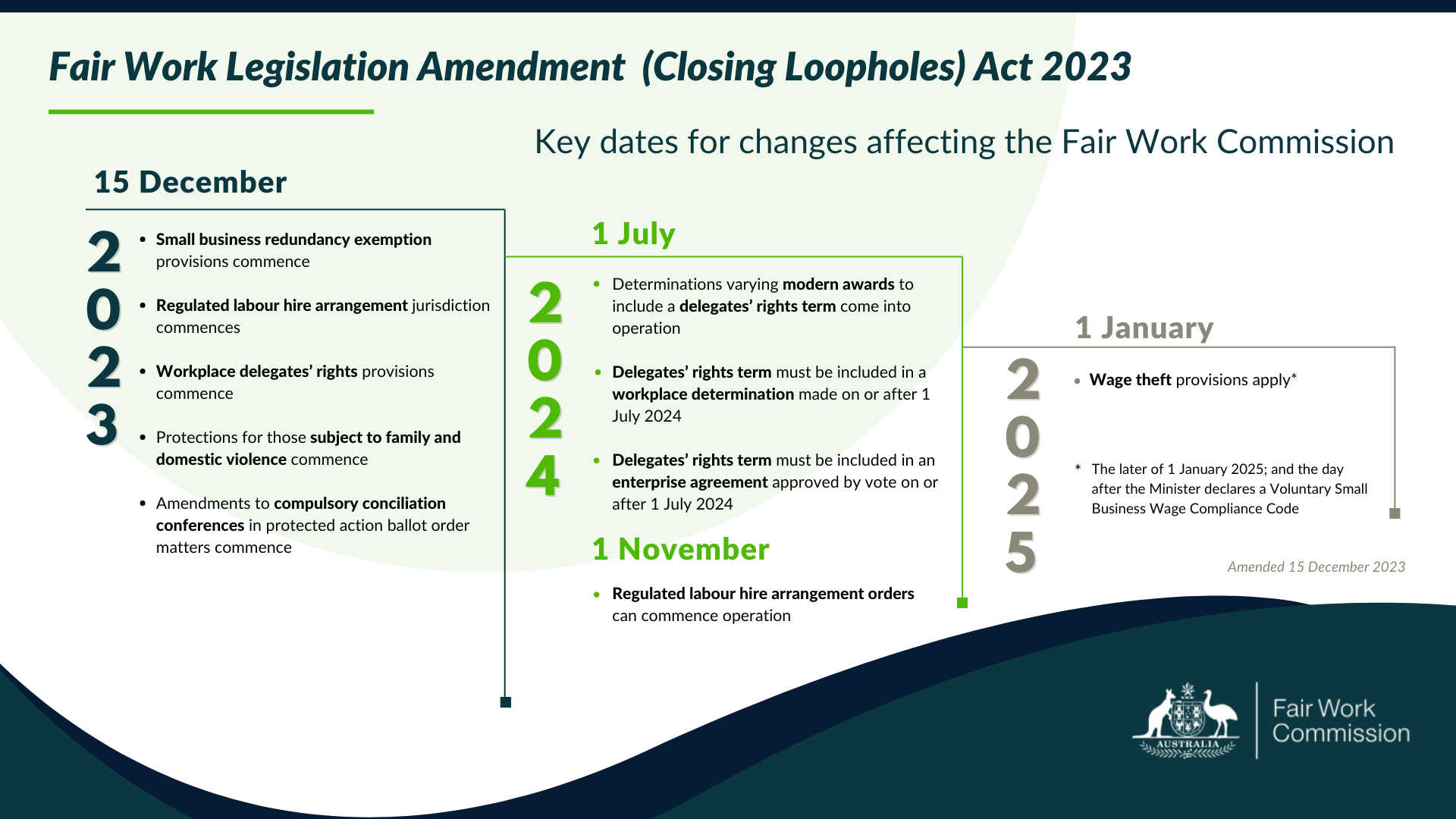Last-minute closure of some of the ‘loopholes’
More changes to employment and safety laws are on their way. While many employers, advisors, lawyers and business operators are still getting across the raft of legislative changes since December 2022, the final parliamentary sitting week of 2023 saw yet another tranche of changes passed and those changes became law on 15 December 2023.
What’s new?
This wave sees the following key changes:
1. Same job, same pay labour hire reform
- Employees and unions will be able to apply to the Fair Work Commission for a Regulated Labour Hire Arrangement Order (RLHAO).
- RLHAOs impact the pay rates of labour hire workers and align the worker’s pay with the rates of a ‘host’ under its applicable enterprise agreement.
- The changes will impact termination payments for labour hire, as a result.
- RLHAOs may be changed and the Fair Work Commission has the power to take into consideration any factors that may be relevant to a RLHAO, such as where labour hire workers will be performing different types of work, or where the applicable industrial instrument has changed since the order was first made.
- Anti-avoidance protections are in place and can have retrospective effect.
2. Wage theft to become a criminal offence
- All employers are currently required to pay their people correctly and on time. However, it’s a ‘civil’ offence if an employer falls foul of the rules. That means hefty fines, repayment and other consequences, but not the risk of a criminal conviction and imprisonment for individuals with responsibility for underpayment.
- New criminal offences are set to start in 2025.
- Employers will face criminal liability, even heftier fines and the possibility of imprisonment for serious and intentional underpayments.
- 2025 may seem like some time away but for many employers, regardless of size, conducting an effective review of compliance to be ready for the laws will take time, resources and planning.
3. Industrial manslaughter
- Occupational health and safety is mostly regulated through State legislation. Many States have already introduced industrial manslaughter laws, including Victoria and Queensland.
- The changes impact the Work Health and Safety Act 2011 (Cth) and create an industrial manslaughter offence for Commonwealth public sector employers and Comcare licencees.
- This offence occurs where an employer breaches its duty of care to a worker in a grossly reckless or negligent manner and that negligence leads to a worker’s death.
- The offence will carry a maximum of 25 years imprisonment for individuals and a fine of up to $18 million for body corporates.
4. Improved rights for employee union delegates
- Improved entitlements have been introduced for employees who are union delegates in the workplace.
- These entitlements will place an obligation on the employer.
- The entitlements include:
- providing the delegate facilities to carry out communications; and
- reasonable access to attend paid training that applies to the workplace delegate (unless the business is a small business).
5. Family and domestic violence
- The grounds on which an employee may seek remedies for unlawful discrimination are expanded to include where discrimination occurs because an employee is facing family or domestic violence.
- This type of discrimination claim is available through the ‘General Protections’ framework in the Fair Work Act 2009 (Cth).
Specific changes for particular industries including those working in emergency services and construction, will also be introduced as a part of these amendments.
Changes still to come
These changes are just some of the foreshadowed changes on the way.
Expect to hear more about gig economy workers and casual employment in 2024.
Intended to align with the bill’s name, these amendments target existing ‘loopholes’ within the Fair Work legislation.
Key dates
The Fair Work Commission has published a helpful table to navigate the staggered commencement dates of the various changes, below.

Source Fair Work Commission website
How will this affect you and your business?
Major changes to the definitions of employment and casual employment, and changes to the gig economy, are expected in 2024.
The recent changes passed hurriedly, impact on all employers. Wage theft offences in particular will not discriminate and have the potential to impact most employers.
The Gadens Workplace Advisory and Disputes team regularly assists clients with ensuring their compliance with the Fair Work Act and preparing employers for changes. Please get in touch with our team if you wish to discuss what the changes mean for your company or organisation.
If you found this insight article useful and you would like to subscribe to Gadens’ updates, click here.
Authored by:
Amanda Junkeer, Partner
Nick Nassios, Lawyer

